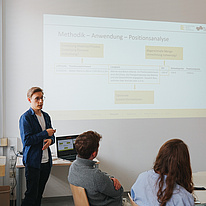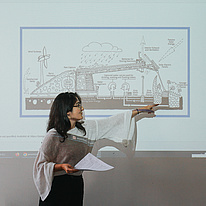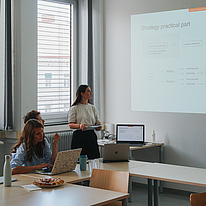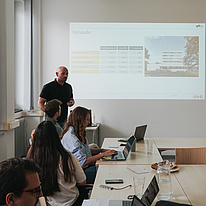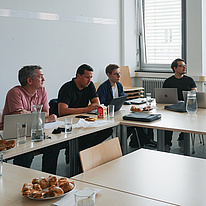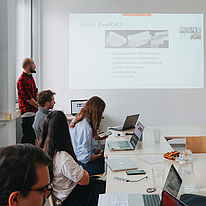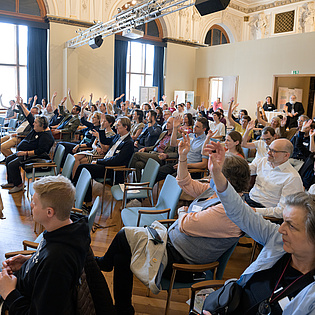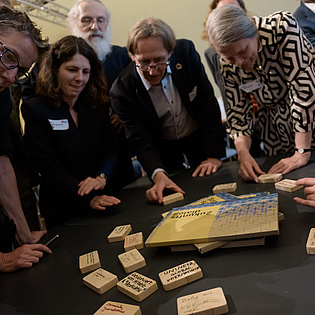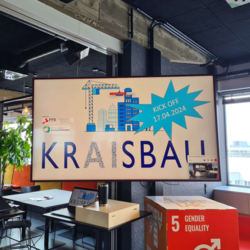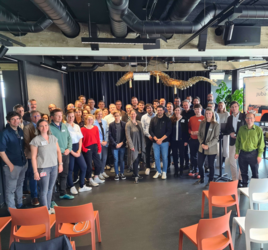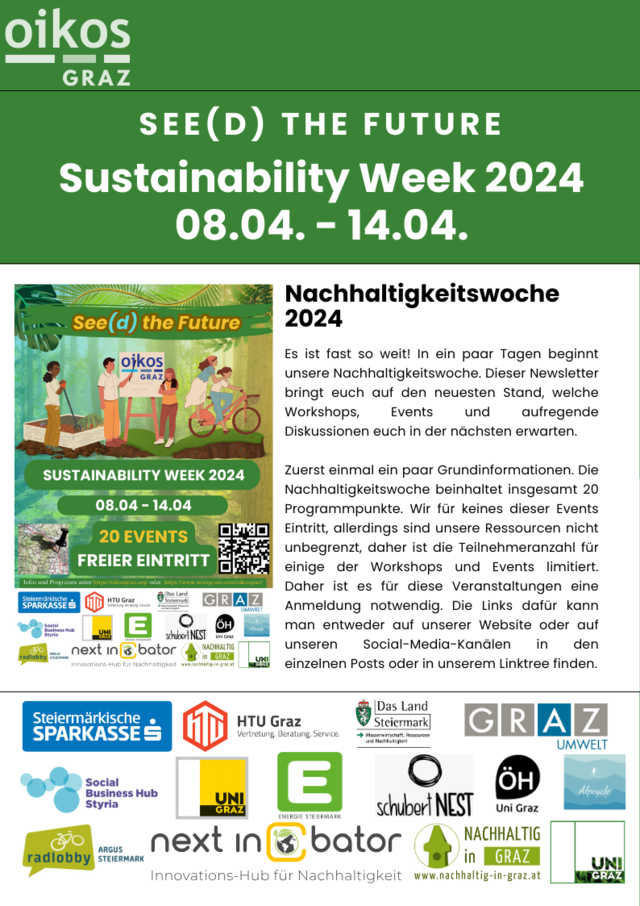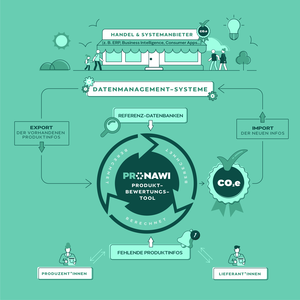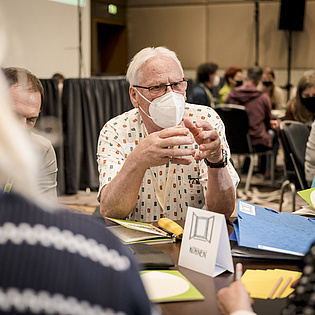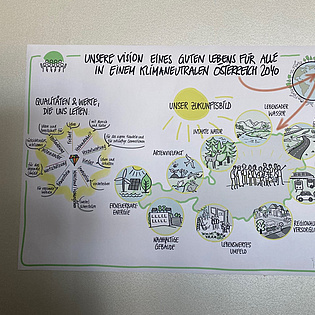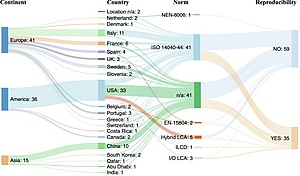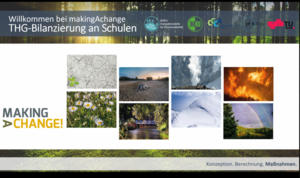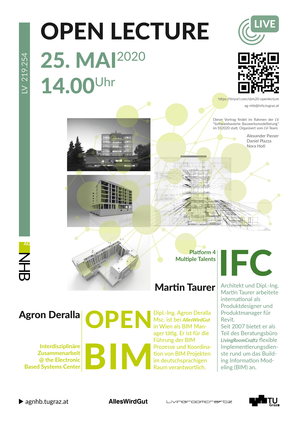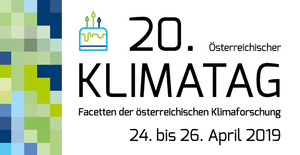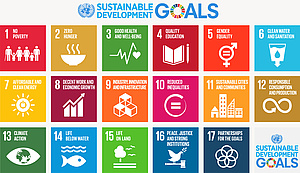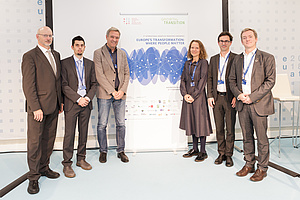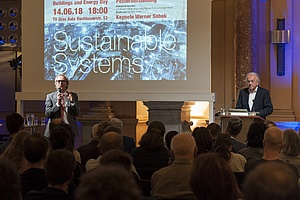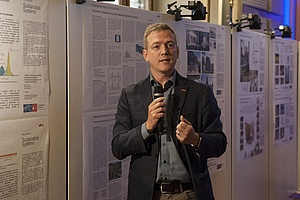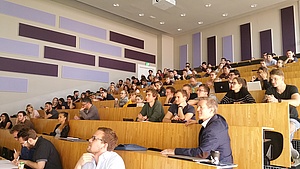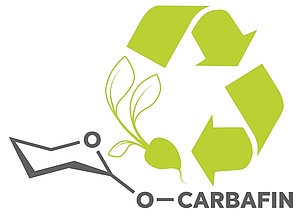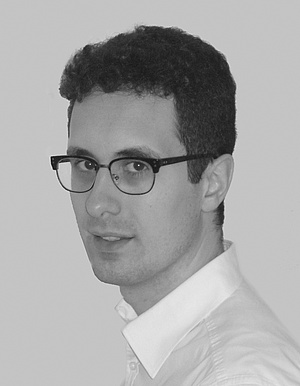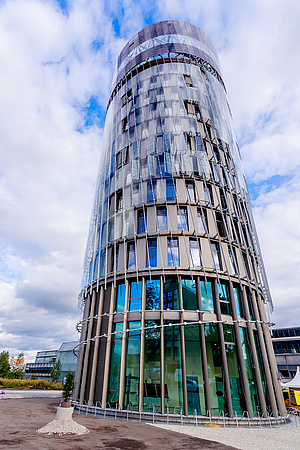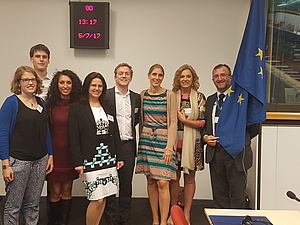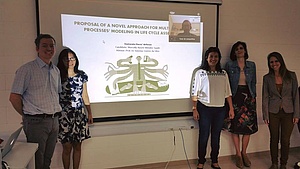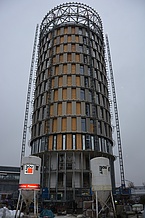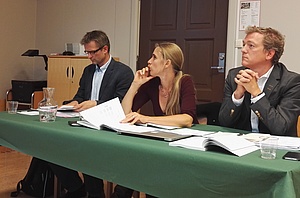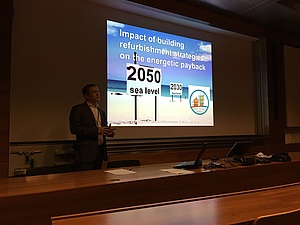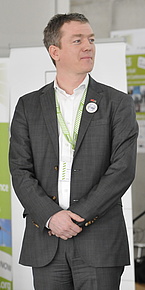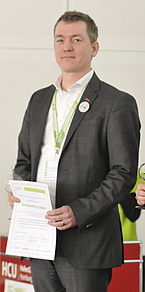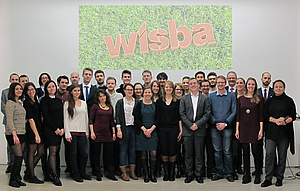10-25 | Open Position - Student Project Assistant

The Institute for Structural Design–Sustainable Construction is currently seeking a student project assistant from the field of architecture or civil engineering.
Roles & Responsibilities:
Research:
− Collaboration on national and international projects
− Data research
− Creation of data analyses and graphics
Teaching:
− Creation and design of teaching materials
− Participation in courses - Administration
− Teaching documentation
Administration:
− General support in institute administration
− Assistance with the institute's online presence and social media channels
Employment Start: December 2025
Application Deadline: 24.10.2025
Job Profile: Student Project Assistant
Hours per week: 16-20 h/w
More Information about Job Profile & Application Form
05-25 | GAM21 - Launch

Last Tuesday (20.05.2025) the faculty celebrated the launch of GAM21 – “Confronting the Environmental Crisis: New Approaches in Architecture”, guest edited by Alexander Passer and Marcella Ruschi Mendes Saade. The launch was marked by a lecture by the distinguished meteorologist Prof. Helga Kromp-Kolb (BOKU Vienna) and included video statements of the new issue’s contributors.
We are particularly delighted about the contribution of Carlos Enrique Caballero Güereca and Nikolas Alaux together with Greg Foliente on the topic of Climate stability for a safe and just future: a new ethic for construction professionals.
04-25 | Congratulations, Nicolas Alaux, PhD!

We are delighted to congratulate Nicolas Alaux on the successful completion of his dissertation entitled “Identification of Future Trajectories for Carbon Budget-Compliant Buildings: An Austrian Perspective,” supervised by Alexander Passer and Marcella Ruschi Mendes.
Human-induced climate change is undeniable and requires a rapid and sustainable reduction in greenhouse gas emissions, especially carbon dioxide (CO2), to ensure a sustainable future. The linear relationship between cumulative CO2 emissions and temperature rise makes it possible to set global carbon budgets and limit emissions in order to achieve the 1.5 to 2 °C targets by 2050. With a 37% share of global energy and process-related CO2 emissions, buildings play a key role. Clear strategies are needed to align emission reductions with the remaining carbon budget, taking into account the entire life cycle of buildings, i.e., construction, renovation, operation, and demolition.
The aim of this dissertation is to identify GHG reduction pathways for the Austrian building stock (2023-2050) that remain within the carbon budget. It begins with the development of a building stock model that integrates dynamic material flow analysis and prospective life cycle analysis. A systematic literature review identifies strategies for reducing greenhouse gas emissions, from which a preliminary list of parameters relevant to the model is derived. The model is refined to incorporate these key parameters, determining their systemic interaction and global sensitivity analyses to assess their impact. Finally, a systematic scenario modeling method is used to create future scenarios and identify those that could remain within the carbon budget.
03-25 | Congratulation, Giovanna Cassavia, MSc!

We would like to congratulate Giovanna Cassavia for the successful completion of her Master’s thesis titled "From Concept to Reality: Assessing the Environmental Impacts of Earthship Construction in Austria" under the Supervision of Prof. Alexander Passer, Nicolas Alaux and Marcella Ruschi Mendes.
With the construction sector being responsible for around 37% of global CO2 emissions, Austria is attempting to achieve carbon neutrality by 2050. However, uncertainties remain regarding the effectiveness of strategies in meeting climate goals, which highlights the necessity of exploring more radical approaches towards the dearbonisation of the built environment, particularly within the single-familiy house typology. With 32% of the total built square meters in Austria, single-family houses stand out as the most built construction type in the countries building stock.
The thesis focuses in the first Earthship house built in Austria in 2023 as its main case study, conducting a comprehensive analysis of the general concept to exam
Call for Masterthesis "Database-Management-Systems"

The Institute of Structural Design-Sustainable Construction is looking for a Master's student from the fields of Data Science, Computer Science or Software Development for a Master's thesis on the topic of database management systems.
The thesis deals specifically with the institute's own program LCAlyse and will be supervised by Alexander Passer (ITE-NHB) and Dominik Kowald (HCC). The work will start in the summer semester 2025.
We look forward to receiving applications at office.nhb@tugraz.at
Call for MSc Thesis "Design vs. Reality in comparison: Life Cycle Assessment of buildings from concept to construction"
The building sector is responsible for around 40% of global greenhouse gas emissions. Assessing the methodological differences in life cycle assessment (LCA) is necessary to accelerate and expand the sector's transition to net zero carbon (WLC). The aim of the master thesis is to close the gap between theoretical and actual environmental impacts of buildings. Using an LCA approach, the study analyzes real buildings as case studies to compare the predicted environmental impacts calculated during the design phase with those measured in the “as-built” phase to reveal discrepancies and potential areas of improvement. This master's thesis offers collaboration with architects and engineers through a 6-month internship in Vienna.
Organizational:
- Start:
- November 2024
- Scholarship:
- at least € 2.500,- fort he successful completion of the Master’s thesis
- Contact:
- Alexander Passer (alexander.passer@tugraz.at +43 316 873 5250)
- Carlos Enrique Caballero Guereca (carlos.caballero@tugraz.at +43 316 873 5255)
- Supervision:
- Arbeitsgruppe Nachhaltiges Bauen am Institut für Tragwerksplanung
- Einszueins architektur: https://www.einszueins.at/
If you are interested, please send a one-page letter of motivation and CV to the Institute of Structural Design at TU Graz, Technikerstraße 4/IV, 8010 Graz, office.nh@tugraz.at (Sonja Senekowitsch, cc Alexander Passer and Carlos Caballero) by October 1, 2024.
More information about tasks, collaboration and desired qualifications of the Master thesis.
NHB Master Day
On the 5th of June, at the NHB Master day, the master's students had the opportunity to present their current work on their thesis to peers and staff of Sustainable Construction at the Institute for Structural Design. The event facilitated a rich exchange of feedback, ideas, and suggestions, all aimed at advancing their research. Engineering and Architecture students explored a diverse range of themes, each with the background focus on enhancing sustainability in the built environment.
Presentations were conducted in a mixed format, both online and in-person, ensuring inclusivity for all presenters.
Topics covered by the students:
Semjon Popek: “Life cycle-oriented sustainability assessment on the basis of invoiced bills of quantities”
Giovanna Cassavia: “From Concept to Reality: Assessing the Environmental Impacts of Earthship Construction in Austria”
Stefan Strohmayer: “LCA des EBS-Gebäudes nach LVs”
Johanna Vogel: "Optimisation of the Building Envelope under the Aspect of Circular Economy"
David Wernig: "Application of Cellulosic Network Structures"
Anna Haller: “CO2 Emissionen in der Holzmodulbauweise - Analyse der Auswirkung von Systemgrenzen”
World Sustainable Built Environment Conference 2024 (WSBE24)
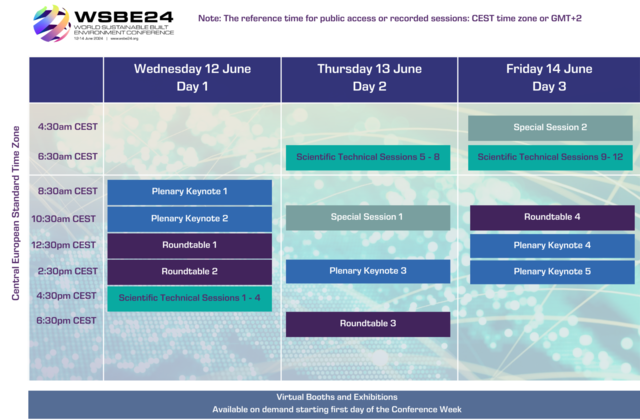
This year's World Sustainable Built Environment Conference will be virtually accessible anywhere on June 12-14, 2024 and anytime on-demand afterwards for 30 days. On 12 June 2024, the WSBE24 program commences with the Opening Plenary session running from 8:30 to 10:00am Central European Standard Time (CEST).
The virtual platform will give all delegates the access to watch LIVE content, pre-recorded sessions, exhibitor engagement via virtual booths and an amazing opportunity to network with all presenters and delegates from across the world.
UniNEtZ- "Zukunftsdialog” (Dialogues for the Future) at the Natural History Museum in Vienna
Everyone talks about transformation, everyone recognizes its necessity - but do we all understand it in the same way?
Scientists and artists from the project "UniNEtZ" have been searching for a common understanding of the much-discussed transformation. The UniNEtZ event "Dialogues for the Future" emerged from this discussion.
The so-called "Zukunftsbausteine" (Building Blocks for the Future) were created to concretize this vision. These "building blocks“ are intended to make the current state of research in various relevant disciplines accessible in such a way that they can be directly linked to political and social discourse. Numerous people from ministries, politics, the media, NGOs and various interest groups attended the "Zukunftsdialog" event at the Natural History Museum at the beginning of May to get engaged in the conversation.
Find all information on Building Blocks for the Future and Dialogues for the Future at: www.uninetz.at/zukunftsdialog
Lecture Series „Alles neu und doch beim Alten“ ("Everything new and yet still the same")

As part of the series "Alles neu und doch beim Alten", lectures on the topic of "Circular building" will take place on 8 May at 5pm.
Venue: HS 8, Alte Technik
The lectures will be held by:
ZRS Architekten Ingenieure
was founded in 2003 as an integrated planning office in Berlin.
Under one roof they combine a broad spectrum of expertise - from architecture and structural design to scientific work in research and teaching. Their work centres on the historical and modern natural building materials clay, wood, bamboo and natural stone.
Dominik Maierhofer | NHB, TU Graz
is a university assistant at the endowed professorship "Sustainable Building" and is currently working on his PhD with the topic: "Carbon Dioxide Reduction vs. Removal: Exploring the Optimum".
The working group focuses on life cycle-based sustainability assessment and low-emission, climate-robust construction methods.
Madaster
is a register that can be used to record data on all materials and products used, including information such as separability, bound CO2 and toxicity. This makes it possible to determine reusability and contributes to the reduction of waste and CO2 emissions, which is crucial for achieving climate targets.
Markus Jeschaunig | Agency in Biosphere
works with his office agency in biosphere at the intersection of ecology, landscape, architecture, technology, public space and activism. He is also co-founder of the transdisciplinary think tank "Breathe Earth Collective".
FFG Project KRAISBAU officially launched with a kick-off meeting
The project consortium of 33 companies, start-ups and institutions will be researching and working over the next four years to implement a circular economy throughout the life cycle of buildings. This will be achieved in particular through the use of AI tools.
However, the project will not only focus on the planning and construction of new, circular buildings, but also on the question of how we can best deal with existing buildings in Austria. How can buildings and their components be digitally recorded? How can we reliably determine which components can be reused and how? How can the service life of buildings be extended? What applications are there for construction waste if a building has to be demolished after all?
The project consortium wants to find answers to these and other questions. The findings will be made available to the entire industry by means of factsheets, roadmaps and training courses.
Sustainabilty Week 2024
Further information: https://oikosgraz.org/
Congratulation, Marco Scherz, PhD!

We would like to congratulate Marco Scherz for the successful completion of his PhD thesis titled „Life cycle assessment-based procurement of buildings using the systemic know-why planning process“ under the supervision of Prof. Alexander Passer and Dr.Helmuth Kreiner. The PhD thesis was successfully defended on December 05, 2023 at Graz University of Technology. The examination committee was composed of Prof. Alexander Passer, Prof. Alexander Hollberg and Prof. Daniela Fuchs-Hanusch.
This study builds upon the recent EU directive on public procurement, advocating for the allocation of building contracts based on life cycle costing and consideration of external environmental impacts. To mitigate greenhouse gas emissions in the construction sector, the researcher introduces the "LCA-based bonus/malus system," a cost model that incorporates environmental building performance into bid prices and facilitates award decisions. Additionally, a hierarchical reference-based know-why model is utilized to uncover interactions between planning decisions, facilitating the future implementation of an environmentally optimized planning process through life cycle assessment (LCA) for building procurement. The development of these models establishes the groundwork for advancing a more environmentally friendly building procurement process in Austria, paving the way for further implementation steps.
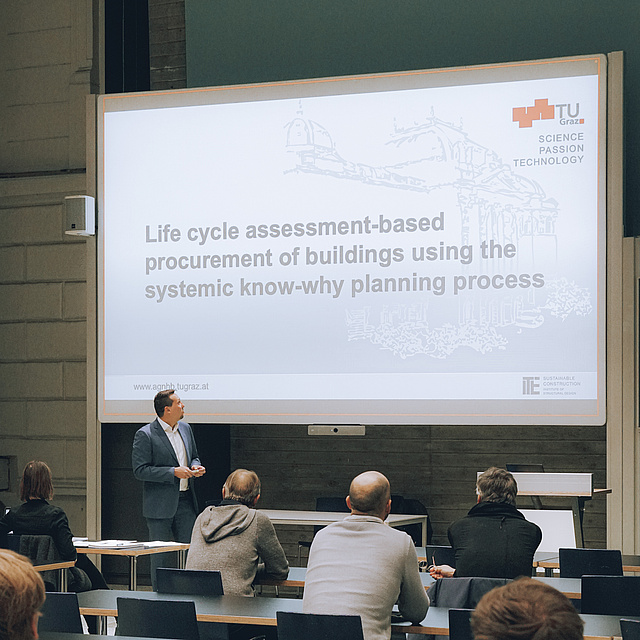
New topic for Bachelor and Masterthesis available

Seminar: IEA EBC Annex 72 - Assessing Life Cycle-Related Environmental Impacts Caused by Buildings
The Steering Committee of the PhD in Civil Engineering (PDEC) of the University of Minho is pleased to invite you to participate in the Seminar IEA EBC Annex 72 - Assessing Life Cycle-Related Environmental Impacts Caused by Buildings, by Professor Alexander Passer (Professor of Sustainable Construction, Graz University of Technology, Austria).
October 13th at 3:00 p.m (WET) / 4:00 p.m (CET)
Meetinglink

Forum SUSTAINABLE spotlights 1.0

Tuesday, 10th of October, 10am-6pm
Biodiversitätszentrum Lustbühel - Landwirtschaft erleben
Lustbühelstraße 28, 8042 Graz
New Climate Advisory Council of the City of Graz!

With the newly established Climate Advisory Council, the City of Graz is providing itself with a body of experts. Among the science experts and civil society organizations that compose the council, Professor Alexander Passer from the Working Group of Sustainable Construction, is representing TU Graz while providing advice, supporting climate protection and climate change adaptation in the City of Graz.
With the unanimous resolution of the Climate Protection Plan, the City Council clearly committed itself to climate protection in March 2022. Graz has set itself the goal of being climate neutral by 2040 at the latest.
sbe22 berlin

The sbe22 berlin D-A-CH conference as part of the SBE conference series campaign 2021 – 2023 will be hosted by the Natural Building Lab of TU Berlin in cooperation with KIT Karlsruhe, ETH Zürich and TU Graz.
Based on the 17 UN Sustainable Development Goals, participants at the hybrid conference in autumn 2022 will discuss the challenges and opportunities presented by current transformation projects and processes at local and regional levels. As part of the SBE network, researchers will have the chance to make links between local approaches and wider regional, continental and global trends. The conference will provide a designoriented, architectural and urban planning entry point to a broad inter- and transdisciplinary debate on the following themes: resource management and material flows, climate neutral buildings, post-fossil infrastructures, critical digitalisation and socio-political frames for transitions. These themes represent key solution fields to address sustainability challenges within the planning, construction and real estate sector.
Environmental impacts of Airium: An Innovative Insulation Material
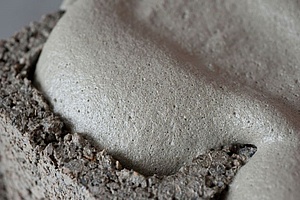
Airium is a mineral foam which is produced on-site thanks to a highly technological truck. It can be used for multiple insulation needs (attics, sub-screed, or walls), therefore replacing traditional plastic materials (EPS, XPS, etc.). A particularity of this insulation material is its ability to rapidly absorb carbon dioxide while it dries, during a process which is called “carbonation”. This compensates for almost half of the greenhouse gas emissions which are emitted during its life cycle.
The Working Group published an Environmental Product Declaration (EPD) for Airium in July 2022, in cooperation with PELMOOSER Beton GmbH. For an EPD, the whole life cycle of a product is taken into account, from manufacturing, to use, disposal and further recycling possibilities.
The entire document can be downloaded here.
04-22 | Endowed Professorship For Sustainable Construction
Since January 2022, Alexander Passer is the new Professor of Sustainable Construction at TU Graz. The professorship is endowed by the Austrian Building Materials Industry Association.
In the framework of the endowed professorship he is now devoting himself even more intensively to the key topics of climate neutrality in the building industry, modelling of the building life cycle and methods of life cycle-based sustainability assessment. Prof. Passer will continue to lead the research and teaching within the Working Group for Sustainable Construction.
In a TU Graz Face to Face interview, Alexander Passer gave a deeper insight in what drives his career.
Johanna Trummer from aircampus, the universities' podcast, interviewed Alexander Passer on what it takes to built sustainably.
You can listen to this and more episodes here!
04-22 | Public Voting Over The Ideas Of The Austrian Citizen Climate Council
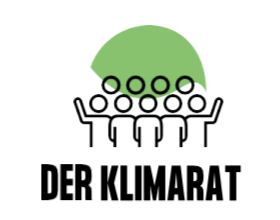
How can Austria become climate neutral by 2040?
Until 8 May, citizens can vote on the Climate Council's proposals in categories such as transport & mobility, buildings & construction and clean energy. The ideas developed in the climate council meetings as well as suggestions submitted online can be evaluated.
04-22 | Summer University Green.Building.Solutions
Application for Green.Building.Solutions. Summer University 2022 (GBS; 7 ECTS) is still possible!
GBS provides world-leading insights into sustainable architecture and the built environment by experts in their fields. The program aims at architects, planners and engineers and takes place from 16 July to 7 August 2022 in Vienna. For the TU Graz scholarship apply until May 2 here and add "TU Graz" as your scholarship reference.
You are interested in applying for GBS, but have some questions left open?
Join the free Virtual Open House Session on 25 April – Registration via Eventbrite.
04-22 | Pro Sustainable Management (ProNaWi) publishes tool for sustainability assessment
The project aims to help consumers understand the amount of ressources and energy behind products at the supermarket. By making this information visible, the project supports sustainable purchasing decisions and ultimately a sustainable management and growth.
A recently within the project published tool enables actors along the value chain all the way up to consumers to check and compare the environmental footprint of their products.
The tool was developed with the help of the Working Group and supports several vendors of organic produce so far.
Included in the footprint are manufacturing, packaging, transport, etc. ProNaWi displays the CO2 equivalent, as well as calculation details and information on data quality.
To speed up the assessment of products, a methodology has been developed that makes it relatively easy to combine existing product information and extrapolate it to new products using similarity analyses.
Find out more about the project on the official website.
The ProNaWi research project is co-funded by the FFG.
04-22 | Business Brunch "Zukunftssicheres Bauen"

On 21 April, the business brunch "Zukunftssicheres Bauen" takes place at MuseumsQuartier, hosted by Franziska Trebut from ÖGUT. Various research projects in the field of sustainable construction will be presented.
Program:
Welcome by Theodor Zillner, Federal Ministry for Climate Action
Spielräume des dualen Weges, Vergleichende Analysen zu "Care for Paris"
Renate Hammer & Peter Holzer, Institute of Building Research and Innovation
Die Sichtbarkeit der Gebäudeökologie - Ökobilanzierung im Ernergieausweis
Bernhard Lipp, Austrian Institute for Building Biology and Ecology (IBO)
PEF4Buildings - EU-Methodik zur Bewertung von Umweltauswirkungen, Level(s) - Piloten für EU-einheitliche Gebäudebewertung
Alexander Passer, Graz University of Technology
Sommerkomfort einfach simulieren - Thesim 3D
Joachim Nacker, Architektur- und Bauforschung GesbR
Dekarbonisierung im Gebäudesektor
Interview with Stefan Schleicher, Wegener Center, University of Graz
Massivbaustoffherstellung als Impulsgeber für Regionen
Stefan Kirchweger, Studia
To attend, please sign up until 14 April here, limited seats.
The livestream can be watched on zoom, registration here.
04-22 | University Programme in Sustainable Construction 2022/23
You can now register for the university's post-graduate training in sustainable construction!
Registration deadline is 28 August. Early birds get 10 % of until May 29th.
The course starts in October 2022 and offers insight into the latest developments in sustainable construction.
It focuses on current methods, theories, trends and tools in the building sector. Additionaly, certification as ÖGNI auditor is offered. The programme is an ideal postgraduate course for managers in the construction industry with a specialisation or an interest in sustainable construction.
01-22 | Austrian Citizen Climate Council

How can Austria become climate neutral by 2040?
Mandated by the Austrian parlament, the new Climate Council, a representative group consisting of 100 people with various backgrounds and different opinions on sustainability and climate change, will work together on recommendations concerning climate mitigation and adaptation actions for Austria.
Gentle scientific support is essential for the independent work of the Climate Council. The council is therefore supported by a 15-member scientific monitoring committee, in which scientists from many different disciplines are represented, including Alexander Passer for the field of sustainability in the built environment.
The main focus (i.e. transport & mobility, diet, clean energy, social justice,...) as well as the exact method of decision making are yet to be agreed on.
Above all the success of the Climate Council will be measured by whether the measures it develops find their way into the political process and are taken into account by the government and parliament. The Federal Minister for Climate Action, Environment, Energy, Mobility, Innovation and Technology Leonore Gewessler promised to take the results very seriously (see press conference).
This was the Citizens' Climate Council 2022: https://www.youtube.com/watch?v=naYT0v5tWVI
01-22 | IEA EBC Annex 72: Monte Verità Declaration

We are happy to share that the final version of the "Monte Verità Declaration on a built environment within planetary boundaries" is now published!
It is addressed to several different stakeholder in the buildings and construction sector.
More than 40 scientists from 20 countries signed the declaration.
The declaration was presented to Andreas Eckmanns, a representative from the Swiss Federal Office of Energy and Swiss representative of the IEA EBC ExCo during the 10. expert meeting of the IEA EBC Annex 72.
12-21 | TU Graz Sustainability Report
The TU Graz Sustainabilty Report for the reporting period 2016 to 2018+ is now published and accessible for the public.
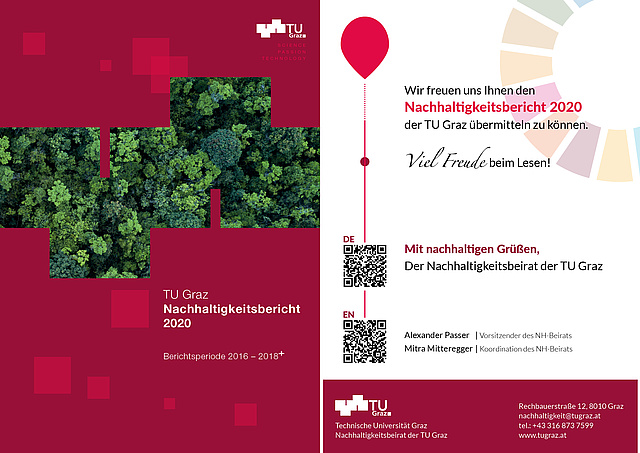
11-21 | Course Start of University Programme in Sustainable Construction
The university programme in Sustainable Construction is a cooperation between TU Graz (Life Long Learning) and TU Wien (Academy for Continuing Education). AGNHB's Alexander Passer is the programme director at TU Graz.
The purpose of the programme is to bring the students up to speed about the developments in sustainable construction. It focuses on current methods, theories, trends and tools in the building sector. Additionally, certification as ÖGNI auditor is possible. The programme is an ideal postgraduate course for managers in the construction industry with a specialisation or an interest in sustainable construction.
This year's course started the week before last.
A warm welcome to all students and good luck with your studies!

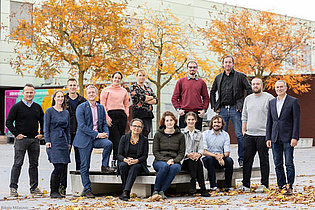


11-21 | Environmental Product Declaration (EPD) for Airium
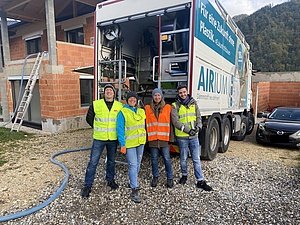
As part of the development of an Environmental Product Declaration (EPD) for Airium, a cementitious insulation foam, the Working Group visited a construction site in Zlatten, to investigate how the foam was being produced and applied in a new residential house. The Airium truck contains all the technological equipment allowing for an on-site production of the foam, which is then transported inside the house through the blue pipe. The foam is then, in this case, poured on the floor under the screed, covering the pipes and the electrical wires. The whole life cycle impacts of this technology, which can be used for example instead of plastics materials (EPS, XPS, etc.), are currently being assessed.
09-21 | Science Day TU Graz – Science for Future
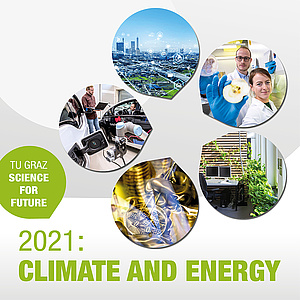
This year's Science Day under the title Climate and Energy takes place on 29 September at Alte Technik and online (the keynote speeches as well as the panel discussion and award ceremony will be streamed live here).
In the afternoon researchers will shed light on the future topic of climate and energy in 8 theme sessions hosted by the 5 Fields of Expertise.
They will focus on new research approaches and technologies in the context of their field of activity and discuss them with guests from science, business and society.
At 1 pm Alexander Passer is giving one of the four lectures hosted by the FoE Sustainable Systems. He will present the latest methodological and technological developments in Sustainable Construction.
To attend please register by sending an email with name and contact to scienceforfuture@tugraz.at.
For detailled information see tugraz.at/research/fields-of-expertise/tu-graz-science-for-future/2021-climate-and-energy/
08-21 | Environmental modelling of building stocks – An integrated review of life cycle-based assessment models to support EU policy making
This new study by Martin Röck et al. presents a systematic review of both the latest scientific literature on environmental modelling of building stocks and related EU policy initiatives. The findings illuminate the strengths and limitations of existing approaches as well as the potential of such modelling and the required directions for future development to provide effective policy support.
Based on the assessment of 104 scientific papers, our study shortlisted and analysed 22 environmental building stock modelling approaches. While promising, these show various limitations on their effectiveness in supporting decarbonization efforts while avoiding burden shifting. Future building stock models should offer extended system boundaries and comprehensive life cycle assessment, improved hotspot analysis and impact monitoring across spatiotemporal scales. A long-term perspective on the entire building stock covering climate and other environmental impacts is needed, as outlined in the latest standards. By linking existing studies to related EU policy objectives, we identify various studies that investigate scenarios and strategies relevant to EU policy makers and highlight research gaps.
The publication can be accessed here.
06-21 | Guest Researcher Bernardette Soust-Verdaguer
From June to early August 2021, the Working Group Sustainable Construction is hosting Bernardette Soust-Verdaguer as a guest researcher. She works as a researcher at the Building Construction I Department of the School of Architecture of the University of Seville. Her expertise area is the Life Cycle Assessment and Life Cycle Sustainability Assessment integration in the building’s design process and design tools.
At the moment, she is concentrated on working in the project the IEA Annex 72 project Subtask 2 and the project “Development of a unified tool for the quantification and reduction of the environmental, social and economic impact during the buildings life cycle in BIM platforms”. During her stay we will focus on working on both projects, and specifically on the development of scientific deliverables and scientific papers related. Moreover, other further collaborations will be discussed.
05-21 | Sustainability Lecture by Eva Schulev-Steindl
Like last May, this year's (H)TU Sustainability Day will take place online on 19 May.
Eva Schulev-Steindl, professor at the Institute of Public Law and Political Science (University of Graz) and head of the Research Center for Climate Law will give the Sustainability Lecture on the topic "Legal policy challenges on the way to climate neutrality".
The climate crisis as a massive social, legal and political task is omnipresent today and has reached the center of social discourse at least since the emergence of the Fridays for Future movement.
Therefore, the lecture will focus on the obstacles that still need to be overcome on the way to the climate neutrality aimed for by the federal government by 2040 and where the impulses for a climate-friendly future are coming from.
The lecture will be streamed live from 16 to 18 o'clock on TUbe and is also available as recording afterwards.
04-21 | Construction Materials for a Sustainable Future CoMS21
The 2nd International Online Conference CoMS, co-organised by Slovenian National Building and Civil Engineering Institute ZAG, University of Zagreb, University of Novi Sad and Bundesanstalt für Materialprüfung und -forschung BAM, took place from 21 to 22 April 2021.
Alexander Passer is one of six Plenary Speakers. His talk is titled Sustainable Construction – New Chances for our Future?
The keynote addresses the latest methodological, technological and policy related developments as well as presents good examples that show that it is possible to create a net-zero GHG-emission built environment. In addition to addressing climatic and environmental concerns, these projects also engage with wider societal concerns expressed in the UN Sustainable Development Goals (SDGs). These positive examples are proof of technical, social and economic feasibility. It is imperative to adopt these practices widely.
04-21 | International Sustainable Energy Conference 2022

The International Sustainable Energy Conference - ISEC 2022, organized by AEE INTEC, sees itself as a promoter for innovative ideas in the areas of renewable energy systems and resource efficiency and is intended to be a forum for research, industry and energy policy.
Alexander Passer, head of the Working Group, is part of the Organizing Comitee of the 2nd edition of ISEC.
Unfortunately, the International Sustainable Energy Conference 2020 (ISEC 2020) had to be postponed by two years to April 2022 due to the effects of the corona pandemic.
The Call for Abstracts will be open from September 13 to October 10. Abstracts, that have been submitted in the last call, will remain in the system and will be reviewed for 2022.
Registration will be open soon.
For further information see aee-intec-events.at/events/isec-2022.
04-21 | Summer Universities of OeAD: Green.Building.Solutions
Green.Building.Solutions Summer University is a three week master-level training for architects, engineers and urban planners. This year, it takes place online from July 17 to August 8. Austria's leading building experts provide in-depth knowledge on passive house standard, sustainable urban development, clean energy technologies, ecological architecture and construction in talks and interactive sessions. The program can be found here.
Apply until May 1 at summer-university.net/gbs-vienna/application/.
At GBS, one scholarship is exclusively reserved for a TU Graz student.
03-21 | Life cycle assessment of roads: Exploring research trends and harmonization challenges
As part of the HERMES-project, Endrit Hoxha et al. published a paper on the Life cycle assessment of roads. To overcome the problems in identifying low-carbon solutions for urban roads, a Systematic Literature Review was conducted. Only 18 % of the total 417 road case studies were classified as transparent and reproducible. Based on these results, the authors proposed several improvements of the life cycle assessment to ensure a harmonized calculation of the environmental impacts of roads.
Open access publication.
02-21 | Invitation to the 21th Climate Day
Because of the current situation, the 21th Climate Day was postponed again12 to 14 April 2021. For the first time it will take place online under the motto "Clash of Cultures?-Climate research meets industry!". The Climate Day is hosted by the Climate Change Center Austria (CCCA) and is the most important networking event of the Austrian climate research community and promotes, among other things, the exchange and dialogue between scientific and non-scientific groups.
The current program including scientific contributions and framing events, as well as all other information about the Climate Day 2020 can be found here.
In each of the scientific sessions there will be 4 selected lectures on current climate research including discussion. In addition, there are thematically appropriate posters assigned to each session, but these are not presented directly in the session. In order to give the posters sufficient presence during the Climate Day, audio poster presentations will be made available on the CCCA website.
Barbara Truger's audio-presentation of a poster on the project ParisBuildings as part of the ACRP-Poster-Session 1 is available here.
A review of the 21st Austrian Climate Day can be found here.
02-21 | TU Graz on the Way to Becoming Austria's First Climate-Neutral University
Based on the results of the Greenhouse Gas Accounting of Graz University of Technology, the University has adopted a roadmap to climate neutrality by 2030. With specific measures and in cooperation with all employees and students, Graz University of Technology plans to fulfill its social responsibility in terms of climate protection and is thereby one of the pioneers among Austria's universities.
Günter Getzinger (Project manager Climate-neutral TU Graz) and Alexander Passer (chairman of the Sustainability Advisory Board) were in charge of creating this roadmap to climate neutrality.
In this interview, they explain the strategy of TU Graz and what measures each employee can take to support Graz University of Technology on its path to climate neutrality. The university is essentially pursuing three strategies: increase in efficiency, eco-effectiveness and eco-sufficiency. The focus is on switching to electricity from renewable sources, low-emission heating and cooling systems, sustainable construction and reducing carbon emissions from transportation.
Biking or using public transportation and travelling by train instead of airplane on business trips is highly encouraged. The university subsidizes e-bikes, tickets for public transportation and the charging of electric cars and supports research projects especially in the area of sustainable construction.
01-21 | makingAchange: Online-Workshops with schools on Climate Change and greenhouse gas reporting
At the end of January and the beginning of February, Alexander Passer and Antonija Wieser, hold interactive online workshops for schools on the topic of climate change and greenhouse gas reporting. The workshops are part of the project makingAchange.
makingAchange is a cooperation project between science and schools. The CCCA - Climate Change Centre Austria, together with the Federal Ministry of Education, Science and Research, invited secondary schools to participate in that project on climate change and sustainability in Austria. The AGNHB is conducting the workshops for schools in the Southeast of Austria, namly in Styria, Carinthia and Burgenland.
The overall aim of makingAchange is to contribute to the transformation of society, to raise awareness and integrate the topics of climate protection and sustainability into the school environment as well as in the everyday life of pupils. More about other topics is to be found on the website.
We are looking forward to a great interesting insights, lively discussions as well as many greenhouse gas reportings of schools.
For schools interested: Soon another Call for the second round of schools participating in the school year 2021/2022 will be announced. For updates check the website.
12-20 | Merry Christmas
11-20 | Seminar "Techno-Economic Research Methods - How to perform a Systematic Literature Review"
On 25 November, Dr. Marcella Ruschi Mendes Saade, who is an employee at the Working Group since July 2020, held a lecture on how to perform a Systematic Literature Review (SLR) as part of a series of seminars organised jointly with the Institute of Business Economics and Industrial Sociology.
The seminar series deal with Techno-Economic Research Methods, which are crucial to every scientific discipline as they ensure rationality and verifiability of scientific findings.
In the seminar, participants were taught the different steps involved in performing an SLR to enable them to differentiate between narrative and systematic reviews, to develop answerable research questions, to design a search protocol and to organize and combine search outcomes.
Two more seminars will take place in December and January. The second one is also co-organised by the Working Group and will be held by Prof. Karen Allacker from KU Leuven on the topic of "Research methods with focus on Sustainability". Registration is open until January 25th 2021. Biking or using public transportation and travelling by train instead of airplane on business trips is highly encouraged. The university subsidizes e-bikes, tickets for public transportation and the charging of electric cars and supports research projects especially in the area of sustainable construction.
11-20 | WSBE2020: Carbon Metrics
Can appropriate carbon metrics in combination with carbon budgets be developed and used by built environment professionals, clients and civil society? Is it feasible to have a scalable approach? Can governments provide clear, useful targets to the products / construction / real estate industries?
Based on the paper "Latest developments in the assessment rules of GHG emissions: biogenic carbon“ published in Buildings & Cities special issue on Carbon Metrics, new findings are presented.
All videos can be watched at buildingsandcities.org.
08-20 | Biogenic carbon in buildings: a critical overview of LCA methods

Hoxha, E., Passer, A., Saade, M. R. M., Trigaux, D., Shuttleworth, A., Pittau, F., … Habert, G. (2020). Biogenic carbon in buildings: a critical overview of LCA methods. Buildings and Cities, 1(1), 504–524. DOI: http://doi.org/10.5334/bc.46
The increasing pressure to reduce greenhouse gas emissions from buildings has motivated specialists to develop low-carbon products incorporating bio-based materials. The impact of these materials is often evaluated through life-cycle assessment (LCA), but there is no clear consensus on how to model the biogenic carbon released or absorbed during their life-cycle. This study investigates and compares existing methods used for biogenic carbon assessment. The most common approaches were identified through an extensive literature review.
Deviation between the results obtained from different methods was 16% at the building scale and between 35% and 200% at the component scale. Of all the methods studied, the dynamic approach of evaluating biogenic carbon uptake is the most robust and transparent.
Find the detailed review of current approaches in the open access publication.
07-20 | Carbon budgets for buildings: harmonising temporal, spatial and sectoral dimensions.

This new study by Guillaume Habert (ETH Zurich), Martin Röck, Alexander Passer, Endrit Hoxha et al. explores the processes for establishing a carbon budget for residential and non-residential buildings. Target values for creating carbon budgets for buildings are important for developing climate-neutral building stocks. A lack of clarity currently exists for defining carbon budgets for buildings and what constitutes a unit of assessment—particularly the distinction between production- and consumption-based accounting. These different perspectives on the system and the function that is assessed hinder a clear and commonly agreed definition of ‘carbon budgets’ for building construction and operation.
Find the detailed review of current approaches to budget allocation and the propsed framework to accommodate these different perspectives and spatio-temporal scales towards harmonised and comparable cross-sectoral budget definitions in the open access publication.
07-20 | BIM and LCA Integration: A Systematic Literature Review
To foster sustainable development, the environmental impacts of the construction sector need to be reduced substantially. Life cycle assessment (LCA) is the established methodology for the quantification of environmental impacts, and therefore has been increasingly applied to assess the environmental performance of buildings. By coupling LCAs with digital design tools, e.g., building information modeling (BIM), the identification of environmental hotspots and their mitigation is possible during the design process. The objective of the study is to identify the current integration approaches, and determine the pros and cons of the integration process from different viewpoints, namely, technical, informational, organizational and functional issues.
Open access publication.
07-20 | Marcella Ruschi Mendes Saade
We are happy to welcome our new team member, Marcella Ruschi Mendes Saade.
Marcella performs research in Environmental and Civil Engineering, specifically working with Life Cycle Assessment applied to the built environment. Her focus is on the development and/or adaptation of life cycle inventories, data uncertainty, impact distribution and dynamic modelling of carbon balances. She has collaborated with the Working Group in other research projects since 2016.
Marcella will join the group as a postdoctoral researcher, supporting different projects and aiding in class preparation and lectures.
05-20 | Open Lecture on Building Information Modeling
This lecture is part of the course Software-based Building Information Modeling (219.254), which deals with geometrical modelling of parametrised objects, semantical modelling, forms of cooperation within integrated Information Modelling and standardisation as well as introduces students to the basic methods and possibilities in the digital construction.
On Monday, 25 May at 14 o'clock, Agron Deralla (BIM-Manager at AllesWirdGut at Vienna) and Martin Taurer (Product Designer for Autodesk Revit and Consultant at LivingRoomCraftz) will share their experience working with Building Information Modeling.
The lecture will be streamed live on tube.
Questions can be asked via feedbackr.
05-20 | Sustainability Lecture by Andrea Steiner
On 13 May, the (H)TU Day of Sustainability, part of the TU Graz' Week of Sustainability, will be held restricted to virtual parts.
This years Sustainability Lecture will take place from 14 to 16 o'clock and can be accessed via tube.
Professor Andrea Steiner, head of the Wegener Center Graz, will give a lecture on the topic "Monitoring climate change - how far are we from fulfilling the Paris Agreement?"
Changes in the composition of the atmosphere affect the earth's climate and cause regional and global climate changes. What do satellite measurements show? How can we differentiate between natural climate change and human influence? What statements can we make about future climate changes? How can we achieve the Paris climate goal and does the corona crisis affect the climate?
Afterwards, Professor Steiner, Rector Kainz, Vicerector Vorbach and members of the Sustainability Advisory Board will have a discussion. Questions may be asked via feedbackr (fbr.io/SL2020).
The recording can be (re)watched at tube.
04-20 | Life Cycle Assessment Electronic Based Systems Center
In April 2020 the Working Group finished the LCA of the EBS-Building, that is currently under construction at Campus Inffeld.
In 2017, the rectorate commissioned the Working Group Sustainable Construction to assess all locations of TU Graz in terms of energy use for electricity, heating and mobility, use of fuels and materials and its canteens. This GHG assessment of Graz University of Technology was published in the GHG report 2017. An evaluation of the grey GHG emissions from the construction of buildings had not been included in this assessment. Therefore the Working Group analysed a reference building regarding its environmental performance including operational as well as grey energy. The complete report can be found here.
Assuming a static energy mix, the most relevant factor on the environmental impacts of the EBS Center over the whole Reference Study Period certainly is the operational energy. Nevertheless, the embodied impacts of the building are also a major factor. Due to this significant share, it is recommended to include also the embodied impacts of buildings in the yearly calculation of the GHG emissions.
04-20 | Environmental Product Declaration published
Due to the extensive know-how in the preparation of Environmental Product Declarations (EPDs) in the construction industry (e.g. EPD-VöZ, EPD-GVTB) the Working Group Sustainable Construction was commissioned by the steel and rolling mill Marienhütte Graz to prepare an EPD for reinforcing steel.
As no suitable PKR-B document was available for reinforcing steels, this document was also prepared and is now publicly available to other EPD producers.
We would like to take this opportunity to thank Marienhütte Graz for the excellent cooperation and look forward to further joint projects.
The entire document can be downloaded here.
03-20 | Sustainable Cities and Communities
In its mission statement Graz University of Technology committed to implementing the UN Agenda 2030 goals. In addition to contributing to the achievement of the Sustainable Development Goals (SDGs) in teaching, research and administration, TU Graz, together with the University of Graz, is responsible for SDG 11 "Sustainable Cities and Communities" within the UniNEtZ project.
„Städte und Gemeinden/Gemeinschaften spielen eine Schlüsselrolle für die nachhaltige Entwicklung in unserer Welt. Derzeit leben ca. 50% der Weltbevölkerung in Städten, bis 2070 werden 70% erwartet. SDG 11 zielt auf die Schaffung nachhaltiger Städte und Gemeinden (bzw. Gemeinschaften) und damit auf die Schaffung einer sozialräumlich gerechten und ökologisch zukunftsfähigen Lebensgrundlage für die Menschen ab. Durch den wachsenden Urbanisierungsgrad ist SDG 11 mit einem der Megatrends des 21. Jahrhunderts konfrontiert. Darin liegen gleichermaßen Probleme wie Potenziale, da es nicht nur auf die Verbesserung der derzeitigen städtischen Infrastrukturen und Lebenssituationen abzielt, sondern auch auf die Transformation hin zu sozial, ökologisch und ökonomisch nachhaltigen Gemeinschaften mit resilientem Charakter. Die wichtigste Herausforderung ist daher die Schaffung von Strukturen, die nachhaltiges Alltagsleben ermöglichen.“ [Allianz Nachhaltige Universitäten in Österreich (2020): UniNEtZ – Universitäten und Nachhaltige Entwicklungsziele – Perspektivenbericht. Wien, Innsbruck, Österreich. ISBN: 978-3-901182-74-7]
12-19 | 124 signatories of the Graz Declaration at SBE19 Seoul, 12-13 December 2019
Participants of the international Sustainable Built Environment Conference SBE19 Seoul in South Korea were encouraged to sign the Graz Declaration for Climate Protection in the Built Environment. The 124 collected signatures were handed to Dr. Rolf Frischknecht, Operating Agent of IEA EBC Annex 72 and owner and managing director of treeze Ltd., Switzerland by Sung Woo Shin, Chair of the Organizing Committee of SBE19 Seoul at the Award Ceremony on 13 December 2019. These signatures show that climate protection in the built environment is not only an European but a global need and challenge.
You can sign the Graz declaration here.
The full list of signatories (currently 380) is also available on that website.
11-19 | New study: Embodied GHG emissions of buildings – The hidden challenge for effective climate change mitigation
In this new study by Martin Röck et al., the importance of reducing embodied carbon of buildings for effective climate change mitigation is showed. By analysing hundreds of life cycle assessment case studies, a global trend and ways forward were identified. While operational GHG emissions are reduced due to energy efficiency improvements, the embodied GHG emissions - i.e. related to sourcing and processing of construction materials - are increasing.
The study shows, that embodied GHG emissions investment for the production of new buildings dominates in the first decade, making their reduction and effectiveness a fundamental aspect in reducing life cycle emissions. Find more about the methodology and the detailed analyse in the open access publication.
11-19 | WohnbauFACTS: Affordability and climate protection in housing are top goals
At the invitation of Landesrat Johann Seitinger, experts including Alexander Passer discussed the future of living at Kunsthaus Graz. Climate protection and the creation of affordable property were the focus of attention.
According to Seitinger, the building sector makes a very significant contribution to climate protection: "About one third of the progress made to date in climate protection comes from this area. Strict insulation standards and heating with renewable energy sources not only protect our climate, but also reduce operating costs."
Professor Passer presented the necessary mitigation and adaptation strategies to cope with climate change, especially in heavely built-up urban areas. These areas are going through a rapid phase of growth and the emergence of heat islands is threatening: "It is essential to plan buildings, open spaces and entire neighborhoods in advance to counter climatic change" says Professor Passer. Our cities then would not only be better prepared for climate change, but they would make an active contribution to climate protection.
You can download the full presentation here.
See also:
10-19 | Certificate of Advanced Studies at ETH Zurich: Regenerative Materials
Guillaume Habert, head of the Chair of Sustainable Construction, ETH Zürich, is launching a new Certificate of Advanced Studies in “Regenerative Materials” dedicated to earth, bio-based materials and reuse materials.
The objectives are to teach the specificities of these low-carbon materials (supply, implementation, adapted architectural design, material properties, construction cost and planning, end-of-life, etc.) through practical experiments, inspiring examples (visits and guest lectures) and exercises based on real case study.
The team, composed of international experts (Wang Shu, Anna Heringer, Martin Rauch, Dominique Gauzin-Müller…) want to teach not only architects and engineers, but also members of city technical services, building contractors, NGOs, in order to globally raise skills in the low-carbon construction sector.
A first session will open in January 2020 (5 weeks of contact lectures during one semester). Courses will be hold in English in order to receive a Swiss and international public. A Master of Advanced Studies will open in January 2021 (2 semesters) and will go deeper into technical details.
09-19 | Graz declaration for climate protection in the built environment
At the Sustainable Built Environment D-A-CH Conference 2019, researchers adopted the Graz declaration for climate protection in the built environment.
An intact natural environment is not only vital for humankind but also provides the basis for further social and economic development. For more than 30 years, the international scientific community has provided a strong body of evidence on the increasingly high atmospheric concentrations of man-made greenhouse gases (GHG) and the need to reduce these in order to limit the damages and risks caused by global warming.
The operation of buildings is responsible for approximately 40% of Europe’s energy consumption and 36% of CO2 emissions, making them the single largest cause of energy consumption and GHG-emissions. In addition, there are energy consumption and emissions caused by the manufacturing of construction products for creation and refurbishment of buildings and constructed assets.
The objectives of limiting global warming require translation into actions for the specific sectors and actors.
You can sign the declaration here.
All signatories can be found here.
08-19 | Book launch "Sustainable Design Process & Integrated Facades"
Buildings must be planned, constructed and operated in such a way that they represent a capital rather than a legacy for future generations.
In the research project UNAB, an interdisciplinary research team of TU Graz took up this challenge with the aim of developing new, integral and hybrid building envelopes with special emphasis on sustainability and implementation in the planning process. By merging two complementary research approaches and integrating different research methods in the areas of design, numerical simulations, life cycle assessment, risk analysis and systemic analysis, a milestone in the operationalization (assessability) could be achieved.
07-19 | Green.Building.Solutions. 2019
We are a partner of the summer school “Green.Building.Solutions. (GBS)”, which will take place from July, 20th to August, 11th 2019 in Vienna.
Therefore, we invite our students to apply for the summer school.
The programme deals with ecological, economical, technical and social aspects of sustainable planning and building. Participants deepen their knowledge in the fields of passive house technology and energy efficiency. The contents are transmitted in close cooperation with Austrian experts in a transdisciplinary and intercultural setting of lectures, excursions and a final project work (information under: www.summer-university.net.)
Application deadline: April, 22nd (resp. June, 30th 2019)
Participation fee (incl. Housing, light refreshments):
Scholarship: EUR 490,- Regular fee: EUR 2000,- for students / EUR 2490,- for professionals
Application here
06-19 | ParisBuildings: Transition of the procurement process towards Paris compatible public buildings
The Working Group Sustainable Construction, the Science, Technology and Society Unit and the Wegener Center for Climate and Global Change teamed up for the project 'Transition of the procurement process towards Paris compatible public buildings' to identify the mitigation potential for the public building sector and to help integrate requirements to reach climate objectives.
In alignment with the Paris Agreement, Austria is committed to development towards a climate neutral society. The ParisBuildings project addresses the implications on buildings in Austria, considering both operational and embodied emissions. Moreover, the project combines environmental with economic assessments and develops Paris compatible public procurement requirements. The derived recommendations are evaluated based on case studies to support Austria’s policymakers.
This project is funded by the Climate and Energy Fund and implemented under the program ACRP.
06-19 | Sustainability Lecture by Verena Winiwarter
SUSTAINABILITY LECTURE by Univ.-Prof. Ing. Verena Winiwarter (BOKU) on Sustainability as a Challenge: Innovations, Preparedness and Interdisciplinary Thinking.
Afterwards panel discussion with Rector Kainz and the Sustainability Advisory Board.
When: 5 June 2019, 12 to 14 o'clock
Where: Hörsaal i9, Inffeldgasse 13, ground floor, 8010 Graz
For further information and registration please have a look at tugraz.at/go/SL.
The event will be recorded.
06-19 | 71st LCA Discussion Forum
On 18 June 2019 the 71st Discussion Forum on Life Cycle Assessment will take place at ETH Zurich and will cover the topic “Environmental Benchmarks for buildings: Needs, challenges and solutions”.
COP23, IEA and an increasing number of countries are extending their consideration from aspects such as building energy demand and emissions from building operation to building construction and the manufacture of construction materials.
This Discussion Forum will allow participants to inform themselves on the state of activities and regulations on the environmental LCA of buildings in Switzerland, European and other foreign countries. It is targeted to LCA practitioners and researchers as well as policy makers in the construction sector.
To register for the whole year or a single LCA Discussion Forum, please use this link.
The program is available at: www.lcaforum.ch
This DF profits from the research activities of the IEA EBC Annex 72 “Assessing Life-Cycle Related Environmental Impacts Caused by Buildings”.
06-19 | Hermes – JPI Urban Europe Project
Starting in 2019, Hermes is an international research project driven by scientists in Norway, Austria and China focusing on the integrated evaluation of energy saving, emission reduction potential and management strategies for urban road systems.
Innovation strategies aiming to improve urban life and development must address the pillars of urban areas: their infrastructural system. In Europe, about 80% of the road network consists of asphalt pavements, requiring more than 275 million tons of asphalt mixture to be produced every year. The negative impact of this production in terms of fossil energy, air quality and resource depletion is immense. If we are to take great leaps towards a sustainable infrastructure this challenge must be addressed. For further information on the project please have a look at the website.
06-19 | Woche der Nachhaltigkeit
Graz University of Technology is campaigning for the UN Sustainable Development Goals (SDGs) and is actively promoting awareness of the SDGs in a week of sustainability from 3 to 7 June. Highlights include a Sustainability Lecture by Verena Winiwarter (Professor at the University of Natural Resources and Life Sciences) midweek and the (H)TU Sustainability Day on Campus Inffeldgasse (for more information check Facebook).
Graz University of Technology is of course also committed to sustainability during the remaining 51 weeks of the year: Together with 17 partner institutions, TU Graz is developing options for implementing the SDGs (UniNEtZ project).
Under the chairmanship of Alexander Passer the Sustainability Advisory Board has taken the lead to advise the university management in terms of sustainability.
05-19 | Impressions from the 20th Climate Day
From April 24 to 26, Austrian climate researchers gathered at the University of Natural Resources and Life Sciences Vienna (BOKU) and the Vienna University of Technology.
Under the umbrella of the Climate Change Center Austria (CCCA), Climate Day, which celebrated its 20th anniversary this year, has become the most important networking event of the Austrian climate research community and promotes, among other things, the exchange and dialogue between scientific and non-scientific groups.
70 posters divided in 5 Sessions on the topics Transformation, Climate I Water I Snow, climate change impacts, agriculture and forestry, and climate change adaptation were presented.
The complete Conference Transcript can be found on CCCA’s website.
04-19 | Science for Future
Since 2018, pupils, students and other (young) people around the world, following the example of the Swede Greta Thunberg, are demonstrating for climate protection and calling for a courageous environmental policy in accordance with the 1.5 ° C target of the Paris Climate Agreement.
In April 2019, an international statement on the climate strikes of the Fridays For Future movement was published. The statement was signed by about three thousand international scientists and published on April 12, 2019 in the renowned journal Science.
"The concerns of climate protesters are justified and supported by the best available science. The current measures for protecting the climate and biosphere are deeply inadequate. We see it as our social, ethical, and scholarly responsibility to state in no uncertain terms: Only if humanity acts quickly and resolutely can we limit global warming, halt the ongoing mass extinction of animal and plant species, and preserve the natural basis for the food supply and well-being of present and future generations. This is what the young people want to achieve. They deserve our respect and full support."
Climate Change Centre Austria (click here to view their press release) and our team support Science for Future and Fridays For Future and therefore encourage other scientists from all fields of expertise to sign the international statement here.
04-19 | Sustainability Advisory Board
The Sustainability Advisory Board is the central body for implementing sustainability at Graz University of Technology. In addition to advising university management in all matters of sustainability, the Advisory Board continuously develops the current sustainability strategy, bundles activities and initiates new proposals and projects.
Sustainability should be anchored at all levels of the university through the activities of the Advisory Board. For example, the Sustainability Advisory Board aims to integrate technology assessment in research and teaching, optimise energy and mobility management at TU Graz, develop measures to achieve the UN Sustainable Development Goals, initiate (research) projects in the field of sustainability and regularly compile a sustainability report.
04-19 | Montagsakademie
“Montagsakademie” is a monthly event hosted by the Center of Continuing Education at University of Graz that offers scientific lectures, intelligible to all, freely accessible and free of charge. The lectures are also broadcasted live in participating regions in Styria, Carinthia, Burgenland, Upper Austria and Salzburg.
This year’s topic is “Schöne, neue Welt!? Wie Wissenschaft und Technik unsere Zukunft sehen“. Aside from talks about cultural studies and humanities, there will also be presentations on technical sciences.
Therefore, Alexander Passer is going to hold a lecture about Sustainable Construction and its future opportunities on April 1st.
Details can be found in the summary and the schedule.
For more information check their website. A recording of the lecture will be accessible on this website shortly after.
01-19 | Visiting Professor Dr. Rebeka Kovačič Lukman
Assoc. prof. dr. Rebeka Kovačič Lukman from University of Maribor is a visiting professor at the Working Group Sustainable Construction since January 2019. Her research focus is: sustainable consumption and production, LCA, circular economy. She has been involved in the coordination and implementation of over 25 international and national projects, focusing on sustainability, energy and environment. She is a core group member at the expert group by the European Commission in the field of Circular Economy Financing in the EU. Until now, she has published over 100 bibliographic units, including papers, conference proceedings, chapters in monographs, etc. Based on the Current Research Information System data, her h-index is 10. In the Web of Science (WoS) database, she has over 955 pure citations of her academic papers, which are in WoS ranked in the 1 % of the highly cited papers in the field.
Assoc. prof. dr. Rebeka Kovačič Lukman will teach the course Environmental assessment of construction materials (206.456). During her stay, she will co-supervise PhD- and master students and collaborate in scientific projects and publications paper in the field of LCA.
01-19 | UniNEtZ
Universities as centers of innovation and training for future decision-makers play an important role in the implementation of the UN Sustainable Development Goals (SDGs).
Therefore, the Alliance of Sustainable Universities in Austria has developed a project titled UniNEtZ - "Universitäten und Nachhaltige Entwicklungsziele".
The official project kick-off took place on 21/22 January at University of Applied Arts Vienna.
Currently, 16 universities / research institutes are involved in the project and will work on the development of an options paper, which should support the Federal Government in the implementation of its sustainability goals.
In addition, the project focuses on improving the networking between the universities and the anchoring of the SDGs in research and teaching.
For further information please visit nachhaltigeuniversitaeten.at and uninetz.at.
01-19 | IEA EBC Annex 72 Questionnaire on the level of application of methods for assessing the environmental performance of buildings across the world
Within our international research project IEA EBC Annex 72 we developed an international survey to improve understanding of the current needs of designers and engineers regarding methods, data and tools for an assessment of the environmental quality of buildings. This survey will be conducted simultaneously in more than 20 countries. The answers will be analyzed and shall serve as guidance for future research activities, knowledge sharing between design professionals in different countries, as well as contributing to future standards and regulations concerning environmental performance.
Participants get the chance to win a free entrance ticket for the World Sustainable Built Environment (WSBE) conference 'BEYOND 2020', which will take place in Gothenburg (Sweden) in June 2020!
Take the AT-version of the survey via bit.ly/A72-AT or a general EN-version via bit.ly/A72-EN.
For more information on the project visit nachhaltigwirtschaften.at or http://annex72.iea-ebc.org.
12-18 | 24th Conference of the Parties to the United Nations Framework Convention on Climate Change
COP24 takes place in Katowice, Poland from December 3th to 14th 2018.
Goals for nations to keep global warming below a target threshold of 1.5°C were set up at a previous COP in Paris in 2015.
COP24 should now encourage all countries to actually start doing something about it by following the rules set up in the COP24-rule-book.
It will also be determined how to finance the implementation of greenhouse gas avoidance measures in developing countries.
Stopping global warming is generally considered to be one of the most important civilizational challenges and is required to achieve a sustainable development.
Under the umbrella of the Climate Change Center Austria (CCCA), numerous Austrian researchers, including Alexander Passer, will present their latest research findings and results of their projects to the participants of the COP24. CCCA’s activities are supported by the Austrian Chamber of Commerce and the Federal Ministry for Sustainability and Tourism and will take place at the Austrian Pavilion.
You can find CCCA's activities at COP24 in detail here.
11-18 | Growth in Transition
This year, the initiative Growth in transition is organizing its fourth international conference, entitled “Europe’s transformation: Where People Matter”, on 14–15 November 2018 at the Austria Center Vienna.
During the two-day event, plenary and parallel sessions will feature inspiring speakers from politics, science, civil-society and the private sector.
Keynote speakers include Ban Ki-Moon (Co-Chair of the Ban Ki-moon Centre for Global Citizens and Former Secretary-General of the United Nations), Elisabeth Köstinger (Federal Minister for Sustainability and Tourism of Austria) and Frans Timmermans (Vice-President European Commission).
The conference will address the transformation towards a sustainable society from very different perspectives. Conference topics will range from social and distributional aspects of a fair society to the role of the financial sector enabling a sustainable transformation.
Graz University of Technology and the Alliance of Sustainable Universities in Austria organized a Session in cooperation with the Federal Ministry for Education, Science and Research, ETH Zurich and Karlsruhe Institute of Technology:
The Built Environment in Transition:
Adaption of Production and Consumption Patterns in the D-A-CH-Region
The aim of the session is to underline the need for a transformation of the built environment. Due to economic importance of the construction and real estate sector covering our human needs for shelter and infrastructure, the anthropogenic material flows and the high energy demand as well as the associated emissions, there is a great need for action in the direction of sustainable development. To tackle these challenges in the sense of the Global Grand Challenges, UN Agenda 2030 for Sustainable Development and the Paris Climate Agreement, a paradigm shift is needed in the construction industry (planers and contractors), on the part of procurers (public and private investors, real estate sector) as well as on the demand side (user needs and user behavior).
Speakers:
Alexander Passer, Professor for Sustainable Construction at Graz University of Technology
Josefina Lindblom (DG Environment, European Commision)
Thomas Lützkendorf (Director of the Centre for Real Estate at Karlsruhe Institute of Technology)
Guillaume Habert (Chair of Sustainable Construction, ETH Zurich)
Oskar Mair am Tinkhof (Salzburg Institute for Regional Planning and Housing)
Günter Getzinger (Graz University of Technology)
You can download the preliminary programme here. For further information check the official conference website.
11-18 | Science in Transition
The European Union and Austria have committed to reducing CO2 and thus to comprehensive measures in the area of sustainability.
The conference "Science in Transition" takes part on November 13th in the run-up of the international conference Growth in Transition.
Hosted by the Alliance of Sustainable Universities in Austria, it addresses these challenges at the level of universities and colleges. As training and research centers, these can provide the necessary impetus for societal changes and thus play a decisive role in the implementation of global development goals.
For further information see invitation and nachhaltigeuniversitaeten.at.
10-18 | EIT Climate-KIC: Climathon
EIT Climate-KIC's mission is to bring together, inspire and empower a dynamic community to build a zero carbon economy and climate resilient society.
In more than 100 cities on six continents, entrepreneurs, students, programmers and policy-makers come together on the October 26th and 27th 2018 to work on new, creative solutions to local climate change challenges (in Graz and Vienna on October 19th and 20th 2018 due to a holiday).
The Climathon is a 24-hour Hackathon and a global movement for the development of solutions of climate change challenges in cities worldwide.
The teams in Graz will be working on four topics:
- Considering public transportation, they will try to figure out how an interlinked public transportation network could look like in the future.
- Working on the topic micro climate, they take deeper looks into how climate and air quality data can be made more understandable for citizens.
- The participants will also work on the topic of photovoltaic and how an efficient usage of renewable energy can be ensured to reduce losses and the need for storage.
- In the last topic, mobility transformation, the focus lies on how citizens can contribute to a transformation to a climate friendly transport system.
We are looking forward to this event and hereby invite every interested citizen to JOIN the Climathon 2018 to create and present their innovative ideas around the topic of climate protection and bring society forward.
“Innovation happens when diverse perspectives are brought together.”
09-18 | Partnering Day at TU Graz
On September 14, 2018 Graz University of Technology, Climate Change Center Austria (CCCA), Climate KIC and MUL hosted the Partnering Day.
In the morning, a meeting took place on topics such as funding opportunities in climate change research and the Climate KIC Ecosystem with the following speakers (to view their presentation click their name):
- Prof. Urs Leonhard Hirschberg (Graz University of Technology)
- Vizerektor Peter Moser (Montan-University Leoben)
- Prof. Karl Steininger (University of Graz)
- Michalis Tzatzanis (FFG)
- Elisabeth Worliczek (CCCA)
- Harald Rauter (Climate KIC)
- York Ostermeyer (Chalmers University of Technology)
- Johannes Naimer-Stach (Climate KIC)
- Christoph Grimmer (EET)
- Katrin Brugger (CCCA)
Afterwards we invited to join the discussion on possible synergies and projects at lunch.
In the afternoon, researchers gathered for the "Climate-KIC-off-Styria" (on invitation only).
08-18 | EURO PhD Summer School on MCDA/MCDM
From July 23rd to August 3rd Marco Scherz took part in the 13th EURO PhD Summer School on MCDA/MCDM in Chania, Greece.
MCDA/MCDM focuses on developing and implementing systematic approaches to decision-making that require consideration of a variety of criteria, goals and perspectives. The application of MCDM methods is an essential contribution to the implementation of sustainable construction, also with regard to achieving the climate goals.
By attending the Summer School Marco increased the solid foundation for his PhD thesis and enlarged his network for important future collaborations.
The pioneers and best scientists of the MCDA/MCDM area gave their lectures within in the Summer School (see program).
For the practical application, the participants had to work on a case study “Urban Sustainability Assessment”. After preparation and presentation (see project presentation) of the case study, the group in which Marco worked, was honored with an acknowledgment of excellence for their outstanding performance in the case project work.
We sincerely congratulate.
07-18 | Guest Researcher Marcella Ruschi Mendes Saade
06-18 | FoE Sustainable Systems: Buildings and Energy Day
05-18 | 25th Anniversary OIB
05-18 | Guest-Lectures BIM
Integral planning processes, simulation and automation in BIM require a wide variety of software solutions and workflows. Autodesk is the leading provider of software for the construction industry. An overview of current R & D projects showed where we are heading in view of the software industry. DI Dr. Thomas Lorenz, Thomas Lorenz ZT:
Thomas Lorenz ZT GmbH unites specialists for project control, general planning, structural design and local building supervision. They mainly realize architecturally challenging buildings and technically sophisticated infrastructure projects. Thomas Lorenz gave insights into the application of BIM at his office. DI Michael Fuchs, IB Lang:
Michael Fuchs is BIM-Manager at engineering office Lang and an expert for HVAC. Based on practical examples from major projects, he presented the transition to Autodesk Revit, as well as discussed everyday BIM issues, challenges and the added value of BIM in HVAC design and coordination.
04-18 | CARBAFIN
“Development of a glycosylation platform cell factory
and optimisation of downstream processing for the sustainable production of glycosides and building blocks”
04-18 | Lange Nacht der Forschung 2018
04-18 | IMMO FutureLab
02-18 | Visiting Professor Dr. Damien Trigaux
01-18 | Guest Researcher Tajda P. Obrecht
01-18 | PEF4Buildings, 2nd Stakeholder Workshop @EC, Brussels
01-18 | Working Group Climate Change Centre Austria

11-17 | Alliance of Sustainable Universities in Austria
11-17 | Inaugural lecture - Assoc.Prof. Dipl.-Ing. Dr.techn. Alexander Passer, MSc.
November 30th 2017 | Aula – Graz University of Technology
The Dean of the faculty of civil engineering invited to the inaugural lecture of Alexander Passer on the occasion of his venia docendi award for the scientific field of Sustainable Construction. Please find the lecture slides and the video from the lecutre including the welcome words of the Rector from Graz University of Technology, the dean, and the head of the institute. LINK: Lecture Slides LINK: Pictures (c) JOfotografie LINK: Video (TUBe.tugraz.at) - lecture starts at minute 2911-17 | IEA EBC Annex 72 Kick-Off meeting
11-17 | COP23: GABC Building Action Symposium
11-17 | New office for AGNHB in the Science Tower Graz
10-17 | Smart Cities (“Stadt 4.0”) in television documentary “Newton”
10-17 | IEA - network event
10-17 | Book launch "IEA EBC ANNEX 57 – Guidline for Construction Product Manufacturers"
09-17 | PEF4buildings - Stakeholder-Workshop in Austria
09-17 | Master's thesis presentation and examination of Richard Deutsch
09-17 | Excursion MED Campus Graz
07-17 | PEF4buildings - 1st Stakeholder-Workshop at European Commission, Brussels
06-17 | New established Scientific Field "Sustainable Construction" at TU Graz
06-17 | World Sustainable Built Environment Conference 2017, Hong Kong
05-17 | IEA EBC Annex 72 - First expert meeting of preparation phase at AUU, Copenhagen
05-17 | Guest Lecture Clemens Kielhauser: Research perspective on Infrastructure Information Modeling
04-17 | Assessment committee member for a PhD degree at UNICAMP
03-17 | PEF4Buildings
03-17 | Concrete Student Trophy 2017
11-16 | Master thesis Martin Röck
11-16 | Visit on the construction site Science Tower
10-16 | PhD guest student
09-16 | ÖGNI Convention 2.1
09-16 | IEA EBC Annex Proposal Workshop Zurich, 15.-16.9.2016
09-16 | Assessment Committee member for a PhD degree at NTNU
06-16 | Special Session CESB16 Prague
06-16 | CESB16 Prague
06-16 | SBE16 ZRH
IMPACT OF BUILDING REFURBISHMENT STRATEGIES ON THE ENERGETIC PAYBACK
Buildings account worldwide for 40% of global energy consumption on 30% of GHG emission. Due to the fact that the building stock plays a key role in achieving these targets. Alexander Passer presented an optimal refurbishment strategy in terms of lowest environmental impact through life cycle assessment (LCA). Three facade refurbishment scenarios (none, minimum and energetic high quality) and onsite energy generation (solar thermal and photovoltaic panel (PV)) were evaluated.MANAGEMENT OF USER AND STAKEHOLDER INTERESTS IN MULIT CRITERIA ASSESSMENT
Individual user and stakeholder interests in the context of project requirements and goals often lead to trade-offs; especially during the early design stage of a building. Helmuth Kreiner presented a new systemic approach linking building assessment and network analysis based on the Austrian building assessment system (ÖGNI/DGNB) and using a reference project of a public office building in Austria. Link to homepage: Sustainable Built Environment Conference06-16 | Book launch "Holz im Hochbau"
Theory and practice
Wood and derived timber products are fascinating due to there fine surface, flexible applications and especially there sustainability over the completely life cycle. Planner and employer need established knowledge, because defective design and bad workmanship could have expensive consequences. The book "Holz im Hochbau" is a user guide for planner, engineers, timber construction companies and students and contains all basically structure issues: new and approved practice, basic material and products, building physics, dimensioning, achievement, processing, tender and economy. It gives a broad base of knowledge and supplies with rules of thumbs, charts and many pictures the practical employment. Book is available at DEGRUYTER05-16 | New scientific assistant
04-16 | Guest Lecture Prof. Dr. HABERT : Sustainable Construction & Environmental assessment
03-16 | Precast-concrete: transparency through environmental product declaration (EPD)
Professional cooporation with TU Graz
Under the scientific leadership of the Working Group Sustainability Assessment it was accomplished to define a standard concrete for precaste-concrete products in consideration of all environmental factors. So it is possible to identify all environmental impacts of the concrete – from extracting the resources to manufacturing in the factory. The published EPD could be used for all Austrian sustainability assessment tools of buildings (ÖGNB, climb:aktiv, ÖGNI). Link to the press release03-16 | Outstanding paper award winner at SBE16 Hamburg
Download Conference Paper: Innovative building technologies and technical equipment towards sustainable construction – a comparative LCA and LCC assessment














